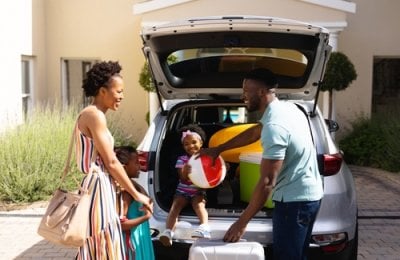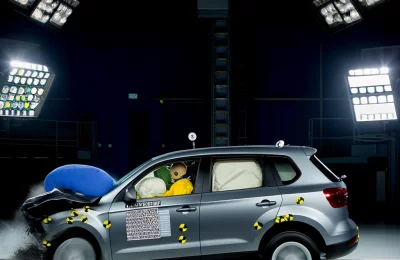
Reading Time: 6 minutes
We all hope and pray that we never experience a tire blowout while driving at high speeds! But what do you do when you hear a loud explosion, and your car suddenly veers off course?
Read on to inflate your knowledge about what can cause a tire blowout; how to react if it does happen, and the steps you can take to avoid it.
The chances of a tire blowout are virtually zero if your tires never touch the ground. But besides having a flying car how do you achieve this? Nationwide Auto Transport can ship your car affordably, safely… and with no chance of a high speed incident
The Tire Blowout Guide
According to statistics, the average driver will have five flat tires in their lifetime. Hopefully, you have a flat tire slowly cruising suburbia, or even better, you notice one before you leave. Nevertheless, it is possible that it could occur on major highways when you’re driving at higher speeds. This guide tells you exactly what to do in case of a tire blowout.
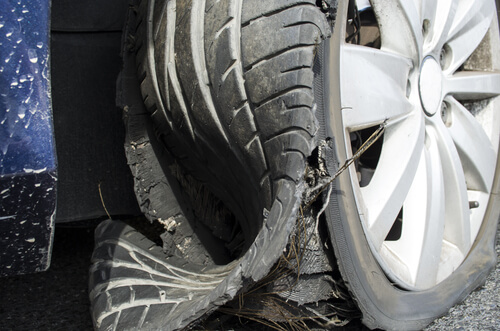
How to Recognize a Tire Blowout
Let’s start with the basics and discuss what a tire blowout is? A burst tire, also called a catastrophic tire failure, happens when there is a sudden loss of air pressure in the tire. There are a number of reasons this could happen, but we look at those bit further down in this article.
The sound and sensations when a tire blows out are very distinctive. A loud explosion-like bang-pop is followed by the vehicle suddenly becoming unresponsive and more difficult to handle. This can be very frightening and dangerous. The National Highway Traffic Safety Administration estimates that 9% of traffic accidents are caused by faulty tires. This won’t happen if you are well prepared to cope with the situation. When you are ready to upgrade your rims, or do some other modifications to your car, read the Cheapest State for Vehicle Modifications: is the One Where you Find the Best Deal.
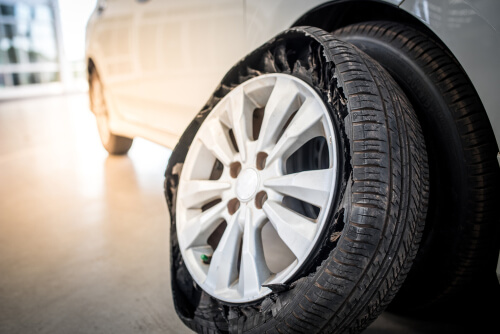
Tire Blowouts: Why Do They Happen?
A tire blowout can happen for a variety of reasons, some more controllable and preventable than others. By keeping tabs on the following items that affect the round rubber orbs that your vehicle drives on, you can minimize the risk of your one of your tires failing:
- Underinflation is not only dangerous, but having too little air pressure also wreaks havoc on your fuel budget, and shortens the tires lifespan.
- Overloading combined with incorrectly inflated tires is a blowout waiting to happen.
- Low tread on worn out tires is a higher risk factor for bursts.
- Slow leaks in the tire make it more likely for it to lose air and blow out.
Is there a “season” for blowouts? Indeed there actually is and its between May and September, with good reason, and as before some you will be able to look after a bit more than others:
- Heat and rubber don’t always mix – You can’t change the seasons (but you can get a quote from Nationwide Auto Transportation and save up to 20%)
- Distance = Wear = Danger. During summer vacations and road trips, people are on the road for longer periods of time and the more time your tires go round and round, the more likely they are to go Boom!
- Potholes and other road hazards can’t be fixed by you, however you can remain alert and do your best to avoid them. Summertime is usually when drivers flock to the roads, but it is also when the most road construction happens, so take extra care.
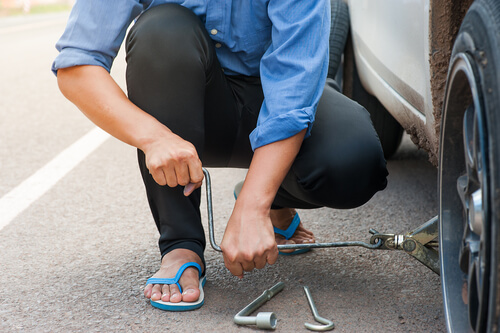
What do I do When I Have a Tire Blowout?
It’s a beautiful day as you cruise at 69 mph down Highway 1… in an instant and with a bang, all Hell breaks loose as you have a right front tire blowout. The next few seconds, and what you do during them, can mean life or death for you, your passengers and other road users around you.
- Stay calm and don’t panic – try to avoid any jerky reactions..
- Grip the steering wheel like you were taught in driving school. 10 and 2 right? This is your best grip to keep your car in a straight line, adjust as you feel your car pulling in another direction and try to keep the car straight as you remain in control.
- Braking is taboo and even when everything screams at you to slam your foot down on the brake pedal…don’t! A slight bump on the gas pedal should straighten you out, then take your foot off the gas and let the car coast naturally to a stop.
- Pull over – For everyone’s safety, but mostly your own, it is always best to try and pull over as far away from traffic, and as soon as you safely can.
- Be visible. Make sure the hazard lights are on and the parking brake is engaged. This way other motorists can see that you are experiencing trouble.
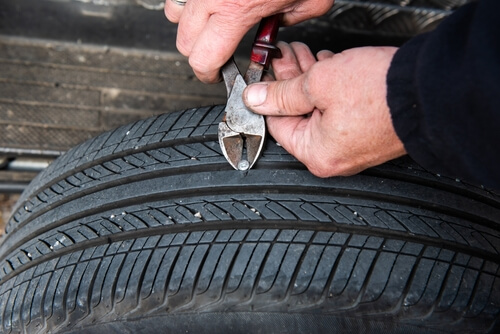
Stay Prepared on the Road with AAA’s Comprehensive Services
For additional peace of mind and support on the road, consider the resources offered by AAA. Renowned for their roadside assistance, AAA also provides a wealth of information on vehicle safety, maintenance tips, and how to handle unexpected situations like tire blowouts. Their services can be a valuable complement to your transportation and vehicle care needs. Learn more about their offerings and how they can help keep you safe on the road by visiting AAA’s official website.
What do I do After a Blowout
You have safely stopped your car on the side of the road…now what? Just breathe, relax and stay calm. The calmness you exhibit will benefit you as well as your passengers.
After taking a deep breath, evaluate the situation but make sure you are safe before leaving your vehicle and calling for assistance. If you need to be picked up or a tire changed, call a tow truck, roadside assistance, or a friend. On the other hand you can do this by yourself if it is safe and you are up to it.
Before you put on the spare tire, make sure things are cool enough to touch, and then drive slowly, using your hazard lights to indicate your intentional slow pace as many spare tires are only for short distances and slow speeds. Have your tire replaced as soon as possible and always do your best to find out the cause of your tire blowout.
How to Prevent Future Blowouts
As I have shown above, there are quite a few factors that you can control to prevent a tire blowout, and the first is basic car care and maintenance. The equation is pretty simple and can be implemented throughout your life. Take care of something, and it will take care of you:
- Check the tire pressure and do it often and get to know your car and what makes it tick – this puts you in control and your maintenance can be more proactive – its much easier to add some air than to fix a blown tire.
- You shouldn’t drive on worn tires. Examine the tread while you’re checking the pressure.
- Overloading should be avoided where possible. Adjust your tire pressure to suit the weight that you are carrying.
- Adding roadside assistance gives you some peace of mind when you are driving, and you will be assisted in the event a tire blowout happens.
- Make sure your spare tire is always 100% ready to take over in case of tire trouble.
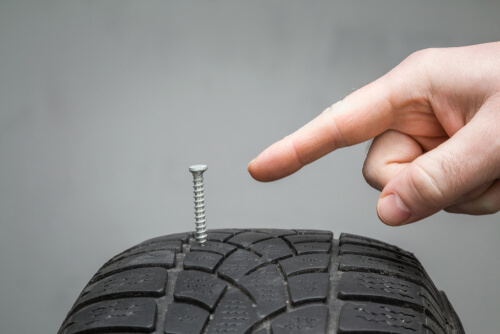
Avoid Tire Blowouts with Nationwide Auto Transportation’s Expert Services
Experiencing a tire blowout can be a daunting ordeal. At Nationwide Auto Transportation, we’re dedicated to not just transporting your vehicle, but also ensuring your peace of mind against tire blowouts and other road hazards.
- Students Auto Transport: Concerned about tire blowouts during your drive to college? Our Student Auto Transport service ensures your vehicle arrives safely at your new campus. As such, free from the risks of long drives.
- Same-Day Car Shipping: In urgent need of shipping your car without the risk of tire blowouts? Our Same-Day Car Shipping option offers a fast, secure, and efficient solution.
- Comprehensive Car Shipping. Avoid tire wear and the risk of blowouts on long trips with our reliable Car Shipping services. Travel without the stress of long-distance driving.
- Classic Cars Auto Transport. Protect your valuable classic car from tire blowouts and other road risks with our specialized Classic Cars Auto Transport service. We handle your vehicle with the utmost care.
- Get a Quote Today: Ready to ship your vehicle and avoid tire blowouts? Use our online calculator for a quick quote, or call our customer service team at 800-311-7073 for personal assistance.
At Nationwide Auto Transportation, we’re here to take the worry out of tire blowouts and vehicle transport. Visit our website to learn more and start your stress-free vehicle shipping experience today!

